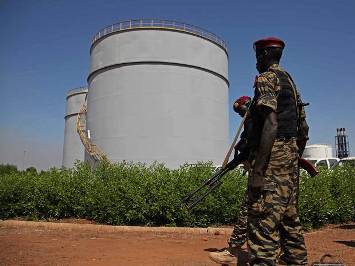S. Sudan denies involvement in dismissal of oil workers
September 10, 2014 (JUBA) – The South Sudanese government has dismissed as reports that oil companies were instructed to terminate the services of some of their employees on the basis of their ethnicity as “mere white lies” and “unhealthy political propaganda”.

Presidential spokesperson Ateny Wek Ateny said on Wednesday that he believed the dismissals were related to the workers long absence from their place of employment and the company’s decision was in line with the terms of the contracts they had signed.
“My understanding of what happened is that the company decided to terminate the service of their employees who left the country without permission and never returned to explain the circumstances which they could not allow them return to report back,” he said.
Ateny was reacting to claims from a group of 14 Nuer oil workers that they had been sacked from their jobs and denied their salary payments at China’s Greater Pioneer Operating Company (GPOC) at the instruction of the government.
Engineer Lony Keah Tut Ngoal told Sudan Tribune on Tuesday that his colleagues had been mistreated by security agents and had since ordered to submit a letter of apology to the ministry of petroleum and mining over their alleged role in the country’s rebellion, which has been raging since mid-December last year between the government and pro-Machar forces.
However, in an exclusive interview with Sudan Tribune, Ateny denied the government had any connection to the company’s decision to dismiss the workers or that it had any prior knowledge.
“Indeed the office of the president just learned it from the media,” he said.
“So what has been reported was not in any way politically motivated. It was purely an administrative affair of the company,” Ateny added.
He also said it was not part of the government’s role to intervene in matters concerning private companies and their employees.
“The allegations that the workers were dismissed on the basis of their ethnicity are unfounded. It was just fabricated for political reasons. Why would the president do that? There are several members of [the] Nuer ethnic group in the government, including the head of security for external bureau, General Thomas Duoth. There are several ministers and senior civil servants and they have not been removed if the issue of ethnicity was the reason,” Ateny said.
In a separate interview, the undersecretary in the ministry of petroleum and mining, Machar Ader, also denied having any prior knowledge of the company’s decision, saying he had been surprised by reports of his involvement in the matter.
“Believe me, I had no idea of what happened in the company because that is an administrate issue and nobody from the oil workers came to us in the ministry with the report that the company had dismissed them on the basis of ethnicity or someone had instructed their dismissal,” said Ader.
However, a senior officer attached to the ministry of petroleum and mining told Sudan Tribune in a separate interview that evidence obtained by the agency suggested the group had joined the rebellion and that both the ministry and the company were informed.
“We have sufficient information that some of oil workers have links with the rebels. We produced evidence to that effect to the management of the company and the ministry of petroleum and mining, but our work ended there. We did not recommend any dismissal on the basis of ethnicity,” the senior officer said.
According to Ngoal, he and other colleagues contracted to GPOC were dismissed from their duties after they failed to report to the company’s Juba base until March.
However, he said the workers had been on a rostered break prior to the December outbreak of violence and that ongoing instability had prevented them from returning to their posts. He said the group had not been paid since January.
Conflict flared in South Sudan after a political dispute within the ruling SPLM party turned violent, triggering tribal tensions across the country.
The fighting has pitted government forces loyal to president Salva Kiir, who hails from the Dinka tribe, against dissident soldiers and ethnic militias from Machar’s Nuer group.
(ST)
